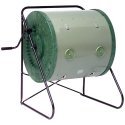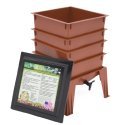The term Organic Compost is well disputed due to the fact that anything compostable, by definition, is organic. In order to compost, carbon molecules are necessary, and by definition anything organic is organic because it contains at least one carbon molecule. Thus the term organic compost is scientifically redundant, is it not? Well, the term organic compost is not meant for really intense letters majoring chemists. Rather “organic compost” seems to exist for the leaf loving passionate few who like to think of mother nature as being “organic” and “compost” a natural part in her system.
What is then, organic compost? Organic compost is the fuel that takes gardeners to new dimensions in their field. Organic compost is the ideal way to start building a repertoire of gardeners’ delights. Things such as hot compost piles, cold compost piles, worm composts, compost tea and others can all be made from good organic composting. To make sure that a compost pile is “organic” it must be prepared, almost like baking a cake. And careful preparation entails carefully planned compost for deeply meditated final compost products.
An organic composter is the type of person who really is environmentally conscious about the kinds of stuff that go into their compost pile. Not just any old thing can be organically composted. TNT, many different explosives, gas, oil, jet fuel, diesel fuels, insecticides and such are all perfectly compostable, but not considered the kind of thing an organic compost pile is made from. Most people when doing composting in an organic way want things that come directly from nature. Mostly non-animal in nature, but that’s being really detailed about it. But basically fruits and veggies are well recommended by those brave and daring souls, be they men, women or children, who, with such a courageous heart, would venture into the knightly Order of organic composters.
In an incredibly obsessive world that delves in consumption, it is no wonder that there are such adventurers as those doing organic composting. Organic compost is an alternative to other forms of compost, in that organic compost will produce exactly what you put into it. That is, if the composting crusader wants a multi-use urban plague fighting organic pesticide, they need to bake the hot pile of hot piles with specific urban plague fighting thermophylic microorganisms that will provide the proper ingredients for a highly aerobic compost tea that stops the plague dead in its tracks.
Truly pathogen thirsty organic compost is usually made by optimizing the initial organic content, with the proper Nitrogen to Carbon ratio. If organic compost is too high in rotting veggies, it will start smelling bad. Neutralizing bad smells means upping the Carbon ratio, which means more peat-moss, paper, wood chips, or sawdust. Anything really absorbent is good. However if the pile has too much of this, it will take far too long to decompose and only a few pockets of usable material might be achieved.
Thus turning organic compost and maintaining the ratio between woody materials and rotting materials is as important as in any other compost pile. Cold piles, however different from hot piles, are usually full of chompers and chompers (mainly read worms) love veggies. These are usually the most organic composts to be found since they start out really natural and produce great fertilizer. Organic compost is also a very socially acceptable way to get people who used to see compost as the icky truths of a rotting world as something almost adventurous or romantically dreamt, now manifesting itself into a better world for our grandchildren.





